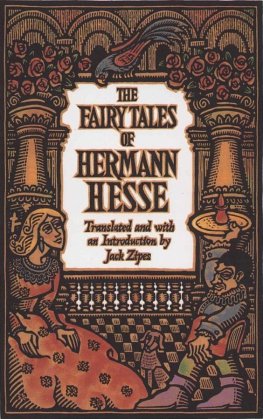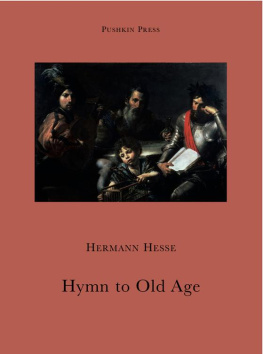Hermann Hesse - Narcissus and Goldmund
Here you can read online Hermann Hesse - Narcissus and Goldmund full text of the book (entire story) in english for free. Download pdf and epub, get meaning, cover and reviews about this ebook. genre: Detective and thriller. Description of the work, (preface) as well as reviews are available. Best literature library LitArk.com created for fans of good reading and offers a wide selection of genres:
Romance novel
Science fiction
Adventure
Detective
Science
History
Home and family
Prose
Art
Politics
Computer
Non-fiction
Religion
Business
Children
Humor
Choose a favorite category and find really read worthwhile books. Enjoy immersion in the world of imagination, feel the emotions of the characters or learn something new for yourself, make an fascinating discovery.
- Book:Narcissus and Goldmund
- Author:
- Genre:
- Rating:5 / 5
- Favourites:Add to favourites
- Your mark:
- 100
- 1
- 2
- 3
- 4
- 5
Narcissus and Goldmund: summary, description and annotation
We offer to read an annotation, description, summary or preface (depends on what the author of the book "Narcissus and Goldmund" wrote himself). If you haven't found the necessary information about the book — write in the comments, we will try to find it.
Narcissus and Goldmund — read online for free the complete book (whole text) full work
Below is the text of the book, divided by pages. System saving the place of the last page read, allows you to conveniently read the book "Narcissus and Goldmund" online for free, without having to search again every time where you left off. Put a bookmark, and you can go to the page where you finished reading at any time.
Font size:
Interval:
Bookmark:
NARCISSUS an ascetic monk; a rigorous intellectual remains in the monastery to become an abbot; the epitome of the masculine, analytical mind. GOLDMUND romantic, dreamy, flaxen-haired boy; celebrates the lush, lyrical, rapturous, sensuous quality of women; leaves the monastery to find his true nature; he epitomizes the feminine mind. NARCISSUS AND GOLDMUND two antithetical natures, the best of friends, who understand and assist each other. "Hesse lifts the contrapuntal play of conflicting forces into a plane as close to music as words will come. What lingers in the reader's mind is a melancholy melody, a romantic "lied" full of wanderlust for a trip into the id." Saturday Review NARCISSUS AND GOLDMUND HERMANN HESSE Translated by Ursule Molinaro BANTAM BOOKS NEW YORK TORONTO LONDON SYDNEY AUCKLAND This edition contains the complete text of the original hardcover edition. NOT ONE WORD HAS BEEN OMITTED. NARCISSUS AND GOLDMUND A Bantam Book / published by arrangement with Farrar, Straus and Giroux, Inc. PUBLISHING HISTORY Translated from the German, Narziss und Goldmund, Copyright 1930, 1957 by Hermann Hesse, Montagnola Farrar edition published 1968 Bantam edition / January 1971 All rights reserved. Copyright 1968 by Farrar, Straus and Giroux, Inc. No part of this book may be reproduced or transmitted in any form or by any means, electronic or mechanical, including photocopying, recording, or by any information storage and retrieval system, without permission in writing from the publisher. For information address: Farrar, Straus and Giroux, Inc., 19 Union Square West, New York, N.Y. 10003. If you purchased this book without a cover you should be aware that this book is stolen property. It was reported as "unsold and destroyed" to the publisher and neither the author nor the publisher has received any payment for this "stripped book."ISBN 0-553-27586-0 Published simultaneously in the United States and Canada Bantam Books are published by Bantam Books, a division of Bantam Doubleday Dell Publishing Group, Inc. Its trademark, consisting of the words "Bantam Books" and the portrayal of a rooster, is Registered in U.S. Patent and Trademark Office and in other countries. Marca Registrada. Bantam Books, 1540 Broadway, New York, New York 10036. PRINTED IN THE UNITED STATES OF AMERICA OPM 40 39 38 37 36 35 34 33 NARCISSUS AND GOLDMUND Outside the entrance of the Mariabronn cloister, whose rounded arch rested on slim double columns, a chestnut tree stood close to the road. It was a sweet chestnut, with a sturdy trunk and a full round crown that swayed gently in the wind, brought from Italy many years earlier by a monk who had made a pilgrimage to Rome. In the spring it waited until all the surrounding trees were green, and even the hazel and walnut trees were wearing ruddy foliage, before sprouting its own first leaves; then, during the shortest nights of the year, it drove the delicate white-green rays of its exotic blossoms out through tufts of leaves, filling the air with an admonishing and pungent fragrance. In October, after the grape and apple harvests, the autumn wind shook the prickly chestnuts out of the tree's burnished gold crown; the cloister students would scramble and fight for the nuts, and Prior Gregory, who came from the south, roasted them in the fireplace in his room. The beautiful treetopsecret kin to the portal's slender sandstone columns and the stone ornaments of the window vaults and pillars, loved by the Savoyards and Latinsswayed above the cloister entrance, a conspicuous outsider in the eyes of the natives. Generations of cloister boys passed beneath the foreign tree, carrying their writing tablets, chatting, laughing, clowning, and squabbling, barefoot or shod according to the season, a flower or a nut between their teeth or a snowball in their fists. There were always newcomers; and the faces changed every few years, yet most of them resembled one another, if only for their blond and curly hair. Some stayed for life, becoming novices and monks; they had their hair shorn, donned habit and cincture, read books, taught boys, grew old, died. Others after finishing their studies were taken home by their parents to castles, or to merchants' and artisans' houses, and then went out into the world and lived by their wits or their crafts. They returned to the cloister occasionally as grown men, bringing their little sons to be taught by the priests, stood for a while smiling pensively at the chestnut tree, then vanished once more. The cells and halls of the cloister, between the thick round window vaults and the trim double columns of red stone, were filled with life, with teaching, learning, administration, ruling; many kinds of arts and sciencesthe pious and worldly, the frivolous and somberwere pursued here, and were passed on from one generation to another. Books were written and annotated, systems invented, ancient scrolls collected, new scrolls illuminated, the faith of the people fostered, their credulity smiled upon. Erudition and piety, simplicity and cunning, the wisdom of the testaments and the wisdom of the Greeks, white and black magica little of each flourished here; there was room enough for everything, room for meditation and repentance, for gregariousness and the good life. One interest would usually outweigh another, predominating in accord with the personality of the incumbent abbot or the tendency of the day. At times the cloister's reputation for exorcism and demon-detecting would attract visitors; at other times the cloister would be known for its fine music, or for a holy monk who had the power to heal and perform miracles, or for the pike soup and stag-liver pies served in the refectory. And among the throng of monks and pupils, whether pious or lukewarm, fasting or fat, who came and lived there and died, there would always be one or another who was special, whom all loved or all feared, who seemed to be chosen, of whom people spoke long after his contemporaries had been forgotten. Even now the cloister of Mariabronn had in its midst two persons who were out of the ordinary, one old and one young. Among the many brethren who flocked to the dormitories, chapels, and classrooms were two of whom all were aware, whom all respected: Abbot Daniel and Brother Narcissus. Though the latter had only recently entered on his novitiate, he had, because of his gifts, been appointed a teacher, mainly of Greek, against all tradition. These two, the aging Abbot and the novice, had special standing in the house; they aroused curiosity and were watched, admired, envied, and sometimes slandered. Most brothers loved the Abbot for his kindness, simplicity, and humility. Only the learned were a trifle condescending in their affection for him, because, for all his saintliness, Abbot Daniel would never be a scholar. He had the simplicity of wisdom, but his Latin was modest and he knew no Greek whatsoever. The few who permitted themselves an occasional smile at their Abbot's simplicity were all the more enamored of Narcissus, the handsome prodigy who possessed elegant Greek, impeccable manners, quietly penetrating thinker's eyes, and beautiful, sharply outlined lips. The scholars admired him for his extraordinary Greek; almost all the others, for his nobility and refinement. Many quite simply loved him, but there were inevitably those who resented his extreme reserve, self-control, and exquisite manners. Abbot and novice, each bore his fate and ruled and suffered in his own way. They felt closer and more drawn to each other than to anyone else in the cloister, yet neither found the way to the other or felt at ease in the other's presence. The Abbot treated the young man with the greatest solicitude, worried about him as though he were a rare, sensitive, perhaps dangerously precocious younger brother. The young man accepted the Abbot's every order, counsel, and good word with perfect equanimity, never argued or sulked, and if the Abbot was right in finding that Brother Narcissus's only sin was pride, Narcissus was a master at concealing it. There was nothing to be said against him; he was perfect and no one was a match for him. Yet, apart from the learned, he had few friends; his distinction surrounded him like a chilling draft. |
Font size:
Interval:
Bookmark:
Similar books «Narcissus and Goldmund»
Look at similar books to Narcissus and Goldmund. We have selected literature similar in name and meaning in the hope of providing readers with more options to find new, interesting, not yet read works.
Discussion, reviews of the book Narcissus and Goldmund and just readers' own opinions. Leave your comments, write what you think about the work, its meaning or the main characters. Specify what exactly you liked and what you didn't like, and why you think so.

